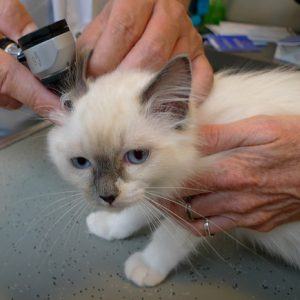Seriously, Take Your Cat to The Vet!
By epetsure

Going to the vet can be a big ordeal for some pet parents. Depending on the size (and cooperation) of your fur family, it can take up a whole afternoon.
Cat Got His Tongue?
Many people assume that if an animal isn’t showing any signs of illness or injury that they’re perfectly healthy. This isn’t always true; cats can’t tell us what’s wrong, leaving many common medical conditions untreated. Even when a pet is displaying symptoms, they may be difficult to detect. Arthritis in cats is indicated by decreased activity level, like Fluffy not jumping as high as she used to. Loss of appetite, listlessness, and excessive drooling are not overtly obvious, so it’s important to pay attention to your cat’s behavior for any unusual changes.
Watch food and water bowls for too much leftover kibble, a sign of appetite loss. Petting your cat is the perfect time to note his weight and coat quality, as well as do a once-over for any lumps or bumps. If you noticed extreme shedding or fur loss, especially out of season, it could indicate stress or other medical conditions. Cats are generally creatures of habit – if you notice something’s wrong, trust your gut and go to the vet. Better safe than sorry!
Preventative Care Saves Money – and Lives
Your cat’s yearly wellness exam is important for preventing disease. An overweight cat can shed a few pounds before becoming obese and potentially developing diabetes or pancreatitis, or cancer can be detected early and cured. Although most pet insurance companies do not cover wellness and preventative care, that doesn’t mean you should skip it! If your cat doesn’t visit the vet, how will any medical conditions get diagnosed?
Vaccines often need booster shots to remain effective, so check the vaccination schedule for your cat’s age. The rabies vaccine is required by law in most states; cats need a rabies vaccination annually or every three years, depending on the type used, and must display a collar tag as proof of vaccination. Feline distemper, herpes, calcivirus, bordetella, and FeLV all require boosters yearly or tri-annually as well.
Pesky Parasites Can Hide Out

(Flikr.com/tom-poes)
Outdoor cats are especially prone to parasitic infections, whether of the skin and fur (external) or internal organs. Kittens are another vulnerable group and should see a vet monthly until they’re four months old in order to monitor growth and administer vaccines. If left untreated, parasites can lead to death in young cats. Adult cats can become malnourished and suffer from nutritional deficiencies, fur loss and loss of appetite.
Your vet will test a stool sample for the presence of internal parasites like coccidia, hookworms and roundworms. Ear mites are another pesky parasite, appearing as coffee ground-like grains in the ear. Other signs of ear mites in cats include excessive itching, shaking or rubbing the head. If you don’t know how to safely clean your cat’s ears, ask your vet!
Lengthen Senior Cats’ Lives

(Flikr.com/kmaraj)
It’s especially important for senior cats to visit the vet regularly – vets recommend twice every year. A feline is considered elderly when he or she reaches roughly 12 years of age, although many cats live to be 20-plus years old. The average lifespan for indoor cats is 12 to 20 years, while outdoor cats lead much riskier (and shorter) lives of only 1 to 5 years. By keeping your cat indoors, you can add years to his life! Many senior cats are too lazy to roam the neighborhood anyways, but it’s especially dangerous for them as their reflexes and senses dull with age.
The blood work and physical exam are extremely important for detecting diseases early. “I like dealing with elderly cats because there are so many things you can do for them; it’s just a matter of being mindful,” says Dr. Annie Price of Atlanta’s Ormewood Animal Hospital. “They can seemingly have no clinical signs and look perfectly healthy, and you check blood work and determine early kidney problems or thyroid conditions or changes in liver values.” Kidney disease is common in older cats, who may start drinking a lot of water and urinating more frequently; if your cat has a history of urinary tract infections(UTIs), pay extra attention to this.
This content is provided by Healthy Paws Pet Insurance. The #1 customer-rated Healthy Paws plan reimburses you for up to 90% of vet bills for accidents or illness. With every free quote for dog insurance or cat insurance, Healthy Paws makes a donation toward a homeless pet’s medical care. Learn more at Healthy Paws Pet Insurance.com.




